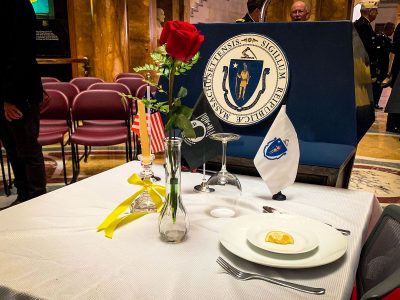
John Cabral never planned to fly Navy planes in Vietnam. Forty-seven years after his aircraft plunged into the South China Sea, his wife Mary Cabral reminisced about the memories of her late husband.
Veterans and family members of former soldiers gathered Monday morning under a stained glass skylight in the Massachusetts State House’s Memorial Hall to honor Veterans Day.
The state’s annual commemoration saluted the Massachusetts residents like Cabral, who served as a member of America’s armed forces.
Various public figures also attended the ceremony, including Massachusetts Governor Charlie Baker and Massachusetts Senator Ed Markey.
John Cabral grew up in Middleton over half a century ago, 23 miles north of Boston, Mary Cabral said after the formal ceremony. He attended Boston College on a Presidential Scholarship and graduated cum laude as a physics major.
Mary Cabral said her husband was pursuing his doctorate degree at the University of Maryland when he was drafted in 1968. John knew he didn’t want to fight on the ground, so he pushed to join the Navy as a pilot.
“When he was in college, one of his friends wanted to be a Navy pilot, and he didn’t want to take the test by himself,” Cabral said. “So, my husband went and took the test with him. My husband passed, he didn’t.”
John Cabral informed the recruiting office he had a pilot’s license which was still valid and so he began flying for the Navy, Mary said. At 30-years-old, he had served for four years and held the rank of lieutenant when his F8 Crusader fighter jet crashed into the ocean.
At the state’s annual Veterans Day ceremony Monday morning, Baker opened his speech by drawing attention to filmmaker Peter Jackson’s 2018 documentary “They Shall Not Grow Old,” which Baker said he watched with his wife the night before.
“[Jackson] took reams and reams and reams of audio that have been collected over the years from many who served in World War I, with piles and piles and piles of video that have been taken,” Baker said. “Then he digitized all of it.”
Baker said Jackson’s film allowed him to see military conflict from the perspective of those in the trenches and said Americans should take every opportunity to thank their veterans.
“We don’t get a chance to be part of this great democracy of ours without the sacrifice of our service men and women,” Baker said. “I think it’s incredibly important for us, as those who benefit from these sacrifices, to express our gratitude on days like this.”
Keynote speaker Gumersindo Gomez, a veteran of the Vietnam War, took to the podium after Baker’s address. Gomez’s spoke about the sacrifices soldiers have made to safeguard the country.
“There are way too many people in this country that call themselves patriots, yet they’re not willing to defend this country by becoming part of the military,” Gomez said. “They don’t understand the fact that this country needs to be defended.”
In a symbolic demonstration after the event’s main speeches, Vietnam veteran Timothy Sullivan, who survived becoming a prisoner of war, performed a candle lighting on a small table draped in white cloth.
Sullivan was flying for the Navy on a route to Hanoi in North Vietnam when his plane was shot down about 15 to 20 miles south of his destination, he said to The Daily Free Press. He was then captured and interned as a POW in North Vietnam for a little more than five years.
“It’s just a shocking thing, and it takes a while to get used to,” Sullivan said. “And then once you get used to it, it all depends on what Americans we were living with and who in the Vietnamese system we had to deal with.”
Sullivan said interactions with the guards were relatively benign. However, Sullivan said some officials in from North Vietnam’s Communist Party were harsher in their treatment of prisoners.
“They were going to indoctrinate you or train you or convert you, or whatever word makes sense, to go along with their philosophy,” Sullivan said. “It was just continual aggravation all the time we were in there.”
Blanche Dellarciprete, an 87-year-old Winchester resident who attended the event, said her first and second husband were veterans. Her first husband was in the Air Force during the Korean War and her second husband served during World War II.
Before they married, Dellarciprete’s second husband was captured by Germans after the D-Day invasion of Normandy, France, she said, and remained a POW until the end of the war.
“While he was in the POW camp, his appendix had appendicitis and he was operated on,” Dellarciprete said. “But then he was sent back to the camps and he had to go to work. And [his appendix] had burst — broke open.”
His appendix would burst two more times before American forces rescued him, Dellarciprete said. After three months hospital-bound in New York, he returned home and the pair — both previously widowed for nine years — were wedded.
“Prisoners of war have after-effects, they have nightmares and sickness and such,” Dellarciprete said. “We had all that but he made the best of it. He was a positive person, he was very positive and life was good as far as he was concerned.”


